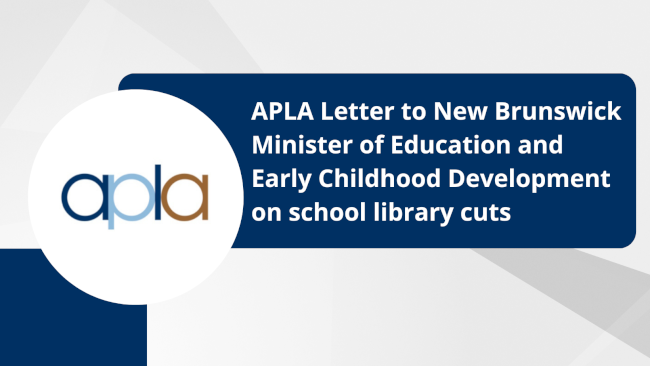
APLA Letter to New Brunswick Minister of Education and Early Childhood Development on school library cuts
May 8, 2025
New Brunswick Department of Education and Early Childhood Development
Place 2000
P. O. Box 6000
Fredericton, New Brunswick
E3B 5H1Constituency Office: Moncton South
366 St. George Street
Moncton, New Brunswick
E1C 1X2May 7, 2025
Open letter regarding school library cuts in New Brunswick
Dear Minister Johnson,
The Atlantic Provinces Library Association (APLA) represents approximately 500 library workers and supporters across the Atlantic Region. We are writing to express our concern about the cuts to school library staff in New Brunswick’s Anglophone School District West. It is disheartening to imagine school libraries trying to be run without trained library staff.
School libraries are more than just the physical space that they occupy in buildings. They support student learning only when they are staffed by school library workers. What we lose from these cuts is access to reading material that is age-appropriate, curated by a professional, and that meets the needs of students for their independent reading inside and outside of school. Not only do school library staff help students select materials off the shelves, but they also prepare presentations and readings of books to help young readers discover new materials that they may not reach for on the shelf. Trained library staff work to check their own biases and ensure the collection is diversified. Library staff know the importance of removing older materials that reinforce oppression and contain outdated information.
Not all students have caregivers who are able to encourage reading within the home, or can access the public library, or even drive or order books online. Without school library staff, many students will not have access to the library services many of us have come to rely on. In rural areas in particular, the school library is often the students’ first and main exposure to reading practices. In removing these positions, you are creating gaps in these schools that are not going to be filled in the future.
Think of a library system as a stool with three legs – the collections, the buildings, and the library staff. If you cut an inch off of one leg, you might not notice at first. Perhaps the stool is a little wobbly. But if you remove a leg, the entire stool collapses. The building is important, but without library staff, who is managing the collections? Who is advising readers on their next great book? Who is checking the materials in and out? Who is shelving books and keeping the library organized and easy for students to navigate? Who is offering a safe, supervised space for students during recess when they may feel unsafe in other areas of the school? These questions are not rhetorical. The answers determine whether a school has an actual library, or merely a book depository.
If provincial Departments of Education wish to champion literacy and the improvement of literacy rates, how can they do so by eliminating positions whose role is central to accomplishing this goal? Professional library staff are trained in research, spotting misinformation, and they can collaborate with teaching staff to help students become informed information users. Our concern is that these cuts will negatively impact student literacy and school communities by taking away important educational resources and putting extra pressure on teachers to fill the gaps. With most teachers already working at capacity, it is unfair to expect them to take on extra library-based responsibilities they have not been trained to provide.
We want to reiterate how important library staff are to school libraries, and how crucial they are to the education system. In light of the importance of their role, we hope you will reconsider the decision to lay off school library staff.
We look forward to receiving your response.
Emily Blackmore, President, on behalf of the Atlantic Provinces Library Association (APLA) Executive
Cc.
Premier Susan Holt – Premier, Province of New Brunswick
Ian Lee – Progressive Conservative critic for Education
Glen Savoie – Leader, Progressive Conservative Party of New Brunswick
Alex White – Leader, New Democratic Party of New Brunswick
David Coon – Leader, Green Party of New Brunswick
Rick DeSaulniers – Leader, People’s Alliance Party of New Brunswick
Monique Boudreau – Directrice générale, District scolaire francophone Sud
Derek O’Brien – Superintendent, Anglophone South School District
Randolph MacLean – Superintendent and CEO, Anglophone East School District
David McTimoney – Superintendent, Anglophone School District West
Marc Pelletier – Directeur général, District scolaire francophone Nord-Est
Luc Caron – Directeur général, District scolaire francophone du Nord-Ouest
Dean Mutch – Superintendent, Anglophone North School District
(Via Atlantic Provinces Library Association)
Add a new comment